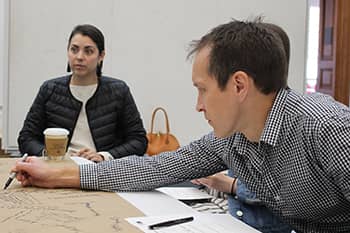Sustainable Cities

SUSTAINABLE CITIES/HNRC 4013H
T/R, 9:30 -10:45 a.m., FALL 2021
GEAR 129
Interested? Current students can apply online. Deadline: 11:59 p.m. Wednesday, March 31, 2021.
Questions? Contact John Treat.
Click here to view the public preview lecture.
Apply for Honors College Courses
|
More than 50% of the world’s population now lives in cities. Cities will continue to be the predominant living condition as people seek urban opportunities. Cities also have the potential to mitigate climate change, pollution, biodiversity loss, and other key sustainability challenges of the 21st century. This course will investigate the many layers of the city—from the meaning of cities
to cities as nested, but non-linear systems—including infrastructure, natural systems,
and cities as narrative and people’s stories. Students will look at key challenges
to sustainable cities in the 21st century, including: They will also learn about adaptive solutions attempting to address these issues, including urban sprawl repair, tactical urbanism, the rise of small-scale developers, the emergence of grassroots community development organizations, and the adaptive reuse and densification of suburban residential neighborhoods. Students will understand patterns, processes, and policies associated with these various
adaptive urban solutions, both in the developing world and North America. Students
will then apply their new knowledge to creative and strategic proposals for sustainable
cities. Course Credit:
|
||
 Noah Billig, Ph.D., ASLA, is an associate professor of landscape architecture and
planning in the Fay Jones School of Architecture and Design at the University of Arkansas.
He teaches design studios and courses in public participation, adaptive urban design,
environmental design and planning, the American landscape, and study abroad in Turkey
and Italy. He serves as the honors director for the Fay Jones School and as director
of the urban and regional planning minor.
Noah Billig, Ph.D., ASLA, is an associate professor of landscape architecture and
planning in the Fay Jones School of Architecture and Design at the University of Arkansas.
He teaches design studios and courses in public participation, adaptive urban design,
environmental design and planning, the American landscape, and study abroad in Turkey
and Italy. He serves as the honors director for the Fay Jones School and as director
of the urban and regional planning minor.